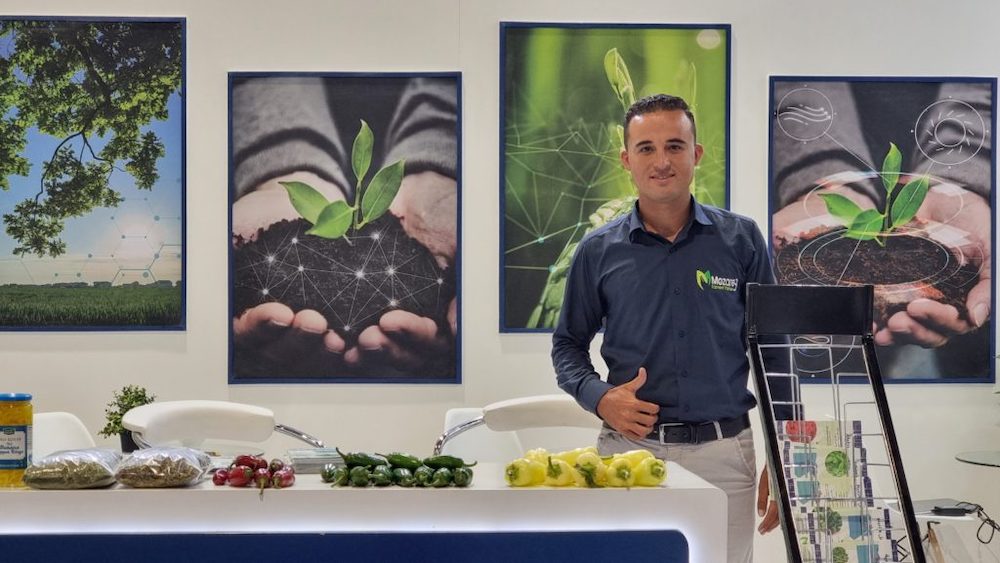With the rise of e-grocers, online ordering, and door-to-door delivery, the way people buy and consume food is now intricately linked to the gig economy. The founders of Mozare3 think the way food is grown should be, too.
Hussein Abou Bakr, Tamer El-Raghy, and Mohamed Okasha launched Mozare3 last year with a mission to introduce contract farming to Egypt’s small-scale farmers as a way of helping them overcome persistent challenges in the local agrifood value chain. Nearly 57% of Egypts’s 102 million people depend on the agriculture sector for their livelihoods. But many farmers struggle to access markets for their goods. They also grapple with lack of price transparency, sourcing and financing high-quality inputs, deciding which crops to grow season to season, and finding expert advice.
“Egypt is lagging in agritech when it has a lot of opportunities and should be leading this domain like other African countries, India, and China,” Abou Bakr tells AFN.
Mozare3 links Egypt’s smallholder farmers to food processors and international buyers directly, on a contract-by-contract basis. The Cairo-based company takes orders from buyers based on their needs and demand, and then contracts farmers to fulfill the order. Once a price is established, Mozare3 then provides farmers with agronomy support and sources of financing for seeds and fertilizers that are compatible with buyers’ requests.
With this model, farmers are able to focus solely on their primary task — farming — and share the seasonal risk inherent to the agriculture sector.
“The greatest impact has been that we have been able to introduce our farmers to a cooperative model, like the ones that are in Europe, where we help them in marketing and selling their crops, financing their needs and inputs, and guaranteeing the quality of those inputs – and, overall, providing the support that the farmer needs,” says Abou Bakr.
Technology as an enabler
Underpinning Mozare3’s model is the founders’ belief in technology’s ability to boost supply chain activities in agriculture. For example, the company has launched a mobile app that delivers agronomy services to farmers and helps them manage back-end business tasks.
Farmers interested in joining Mozare3’s community download the app and then await a visit from the startup’s agriculture engineers, who do an assessment report on each individual farm to qualify them to join the network. Once onboarded, the farmer can then use the app to sign contracts, access financing, and secure tailored agronomy services from Mozare3’s network of experts.
The app — which is being trialed with 200 farmers — “Uberizes” agronomy support by enabling Mozare3 to work with agricultural experts on a freelance basis.
The startup’s founders also see the platform as a tool for helping farmers secure sources of funding crucial to fulfilling their contractual obligations. Mozare3 currently provides financing from its own balance sheet. But Abou Bakr says the data insights it gathers from farmers could facilitate finance from other lenders.
Leaning on experience
Mozare3 closed a $1.1 million pre-seed funding round earlier this year. Algebra Ventures, Disruptech, EFG-EV Fintech, and several angel investors participated.
“One thing that helped us was our team. We [all] have 15 to 20 years of experience in the agri-value chain,” Abou Bakr says on raising capital so soon after launching the company.
Abou Bakr himself has 20 years of experience in both small-scale and commercial farming, processing, and trading. El-Raghy has been involved in agri-fintech and Okasha is a successful fintech entrepreneur. Mozare3’s team also includes experienced agronomists, developers, credit finance analysts, and support engineers who understand buyer needs and concerns, like pesticide residues and crop attributes.
With the funding it has raised, Mozare3 is aiming to on-board 800 contract farmers by the end of 2021, growing to 3,000 by the end of 2022. Furthermore, the startup aims to provide 30,000 farmers with access to services such as spot-market trading, genetic agronomy support, and discounts on inputs from agri-dealers.
It’s also working on a credit-scoring system to help drive better access to financial services for unbanked farmers.
The company’s focus will be on the Egyptian market for the next two to three years, while also looking to establish partnerships in other markets where native specialty crops like coffee and spices are grown.





